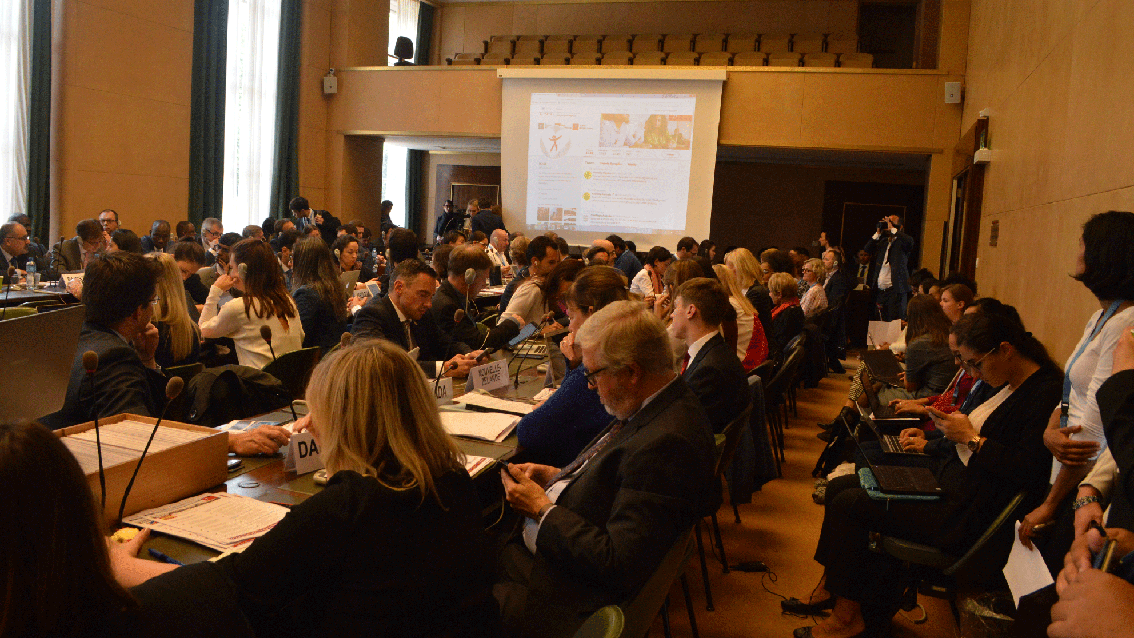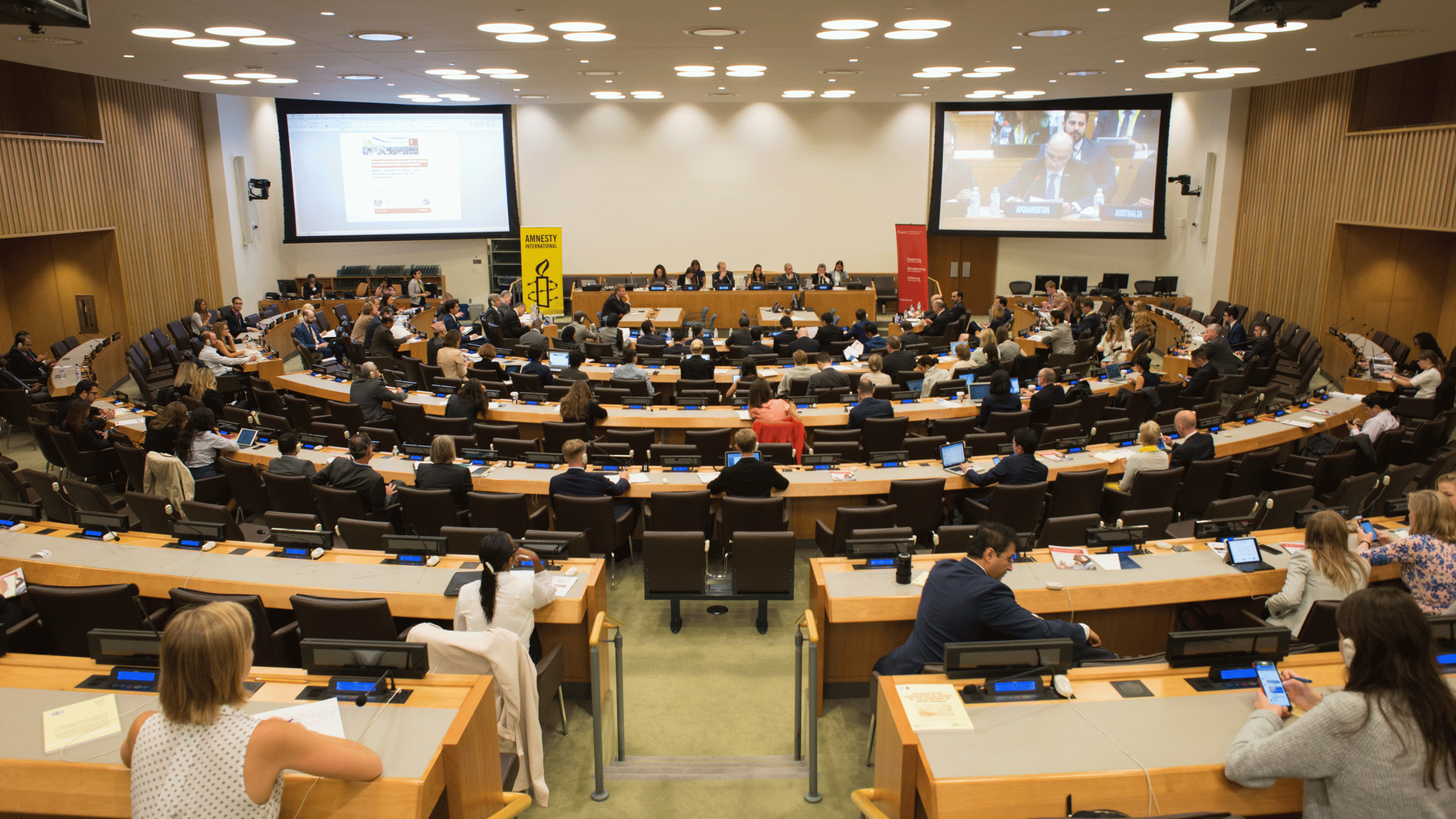The Human Rights Council Pledging Event – which has become part of the annual calendar of events in New York and run for the second time in Geneva – provides an opportunity for dialogue between different stakeholders. With the generous sponsorship of Iraq, the Czech Republic and Uruguay in New York and Uruguay, Albania and Canada in Geneva, the events aim to enhance transparency and accountability in human rights council elections and promote adherence to Council membership standards.
A record number of candidate States participated in this year’s two events – 15 in total. Of the contenders for Council membership – Australia, Afghanistan, Angola, Chile, Democratic Republic of the Congo, Malaysia, Mexico, Nepal, Nigeria, Pakistan, Peru, Qatar, Senegal, Slovakia, Spain, and Ukraine took part in at least one event – Nigeria was the only candidate State that was not present in either event. Participating States spoke to the importance of all candidates taking part in such an event.
For the 2017 elections, the same number of candidates as vacancies have presented themselves in all but one region (Asia Pacific), resulting in what is known as ‘closed slates’. ‘Elections to the Human Right Council are often not as competitive as we would hope. Unfortunately, all too often closed slates are the norm. This year, we welcome the competitive nature of the Asia Pacific slate – and the participation of all candidate States from that region in the event. We encourage other regions to be inspired by their example’, said ISHR’s Legal Counsel Tess McEvoy.
Facilitated by Andrew Gilmour, Assistant Secretary-General for Human Rights, in New York, and Kate Gilmore, Deputy High Commissioner for Human Rights, in Geneva, candidate States were asked questions from the audience as well as from twitter using the hashtag #HRCPledging. For example Australia, as a key supporter of National Human Rights Institutions, was asked whether it would reverse cuts to the funding of the Australian Human Rights Committee.
Themes running through the New York event included the importance and central role that civil society plays in the Human Rights Council, and the integral and key role National Human Rights Institutions play in the promotion and protection of fundamental rights. Another discussed topic was the need to strengthen the liaison between the New York and Geneva UN offices and thus, the links between peace and security and human rights.
In Geneva, a recurring theme was the discussion of possible measures to promote the realisation of the General Assembly resolution 60/251, which states that Council members shall uphold the highest standards in the promotion and protection of human rights. Mechanisms were suggested on how to ensure council members can seek to ensure other members adhere to human rights standards. Furthermore, the protection of rights of human rights defenders was a key theme.

During the events commitments were made on national human rights situations:
- Afghanistan highlighted its full support to its National Human Rights Institution and noted that if elected they would support the engagement of civil society in the United Nations.
- Australia spoke of working to advance the human rights of indigenous people around the world, of their commitment to the global abolition of the death penalty, and upholding equal rights for LGBTI people.
- Chile pledged to strengthen the role of civil society and NGOs nationally.
- The Democratic Republic of the Congo affirmed their efforts to implement their national action plan for the protection of human rights defenders and civil society organisations, which they developed together with the OHCHR.
- Malaysia highlighted its active support to international action to advance rights of women, children, and people with disabilities.
- Mexico acknowledged that human rights defenders and journalists are often victims of violent attacks and crime and promised to reinforce their protection mechanisms through partnership with the civil society and the establishment of a national commission of human rights.
- Nepal reinforced its commitment to implement human rights in its Constitution.
- Pakistan emphasised the link between human rights and democracy, and said that its blasphemy law will be abolished if it is brought to parliament by the Pakistani citizens.
- Peru underlined its commitment to address poverty, and promised to count on the input of civil society in the implementation of policies to prevent civil conflict.
- Qatar noted its intention to ensure greater protection for migrant workers and to improve the status of foreign employers.
- Senegal is committed to strengthening their democracy, good governance and transparency in the management of public affairs and the promotion of human rights namely the question of gender equality.
- Ukraine spoke of the ongoing implementation of its national strategy of human rights, achieved through close cooperation with civil society and international organisations.
As well as in relation to activities as Council members:
- Slovakia sought to work towards the Council becoming better at preventing human rights violations, rather than responding to them.
- Spain would like to work towards a more universal Human Rights Council and asserts its support for small states in development to be allowed in the council and all its meetings.
‘ISHR urges the candidate States of the 2017 election into the Human Rights Council to take their future membership seriously, uphold the highest human rights standards and cooperate fully with the Council and other human rights mechanisms’, said Michael Ineichen, ISHR’s Human Rights Council Advocacy Director.
‘When elected, we also expect new members to implement their pledges, and engage closely with national and international civil society to review and adapt their human rights priorities’, Ineichen said.
For more information concerning the upcoming Human Rights Council election and to view our scorecards, which offer a quick, objective comparison of the human rights situation of candidate States, click here.
You can also catch up on the events by watching the New York event on UNWebTv and/or the Geneva event on the ISHR Youtube channel.
Photos of the dicussions can be found on our facebook page.
Contacts: Tess McEvoy, [email protected] and Michael Ineichen, [email protected]
Update 24 November 2017
Following the HRC election events, questions received on Twitter and email were submitted by ISHR to candidates for Human Rights Council membership.
See Australia’s responses here.
See Ukraine’s responses here.
Photos: Lorena Russi Serna, lorenarussi.com (New York) and ISHR Geneva)





